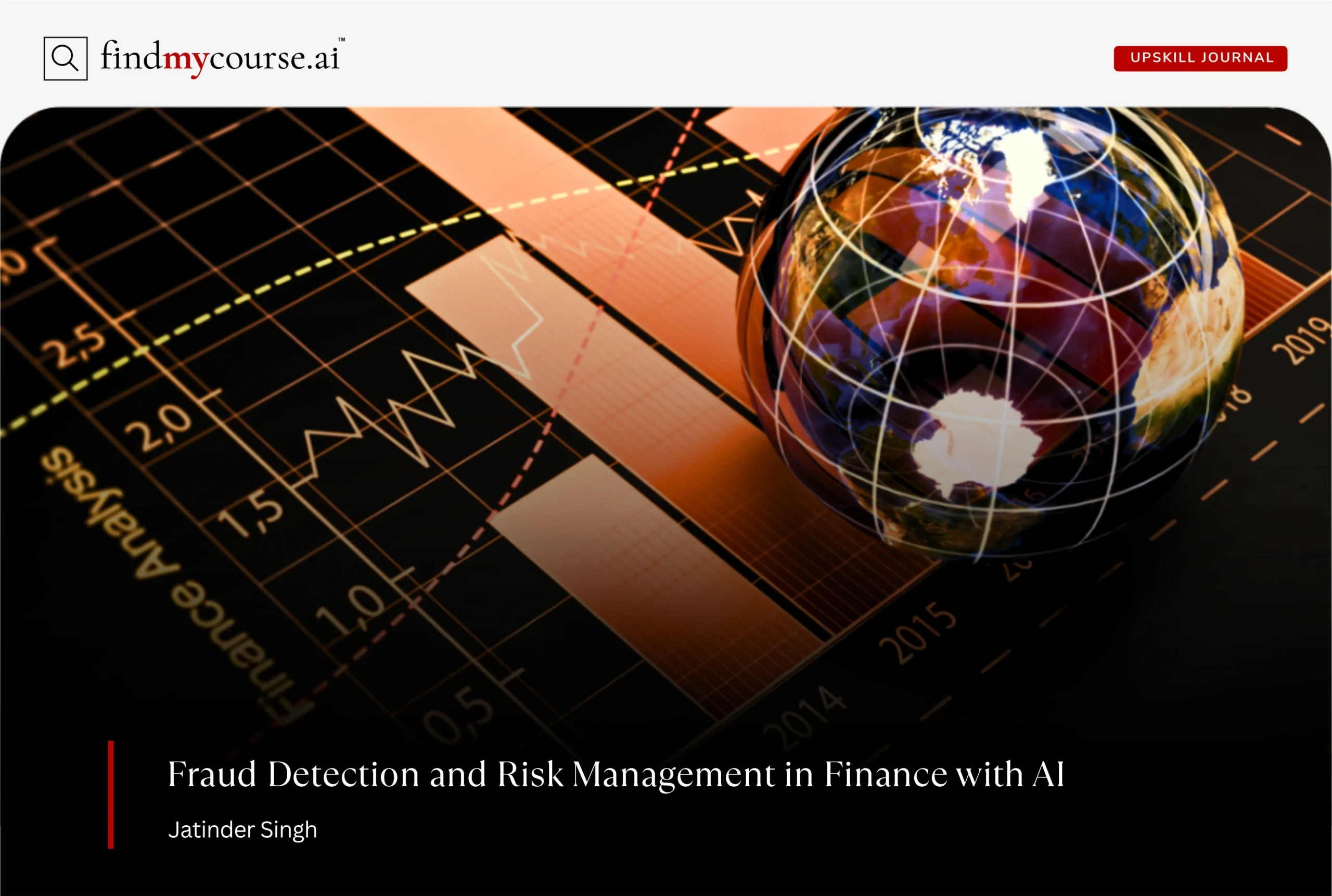In a world where a single fraudulent transaction can cost millions, AI in Finance is turning the tide, empowering institutions to detect threats instantly and manage risk with precision. Advanced algorithms now flag suspicious transactions in real time, uncover hidden patterns of risky behavior, and forecast potential market disruptions with unprecedented accuracy.
Banks, fintechs, and investment firms are no longer reacting to threats—they are anticipating them, protecting assets, and safeguarding customer trust. For finance professionals, understanding AI’s role in risk management and fraud detection is no longer optional—it is essential for staying competitive and shaping a secure, technology-driven financial future.
The Role of AI in Finance
AI is reshaping finance by enabling smarter decision-making, faster data processing, and more accurate insights. Technologies like machine learning, natural language processing, and generative AI allow institutions to analyze massive datasets in real time. This not only improves efficiency but also strengthens risk management, fraud detection, and strategic planning.
Key contributions of AI in finance include:
- Data Analysis at Scale: AI processes complex financial data rapidly, uncovering trends and anomalies humans might miss.
- Fraud Prevention: Machine learning detects suspicious activity and reduces financial losses through proactive monitoring.
- Investment Strategy Support: Predictive models guide portfolio managers to make informed, timely, and data-driven decisions.
- Customer Insights: AI personalizes services, tailoring financial products to individual behavior and preferences effectively.
- Automation of Routine Tasks: Repetitive operations, including reporting and transaction processing, are streamlined, freeing up professional resources.
AI-Powered Risk Management: From Reactive to Proactive
AI transforms risk management by analyzing vast data in real time, detecting anomalies, forecasting potential threats, and simulating scenarios. This enables institutions to act proactively, reduce financial exposure, maintain compliance, and protect assets, turning risk management from a reactive task into a strategic advantage.
Predictive Analytics: Forecasting Market Risks
AI models can analyze historical and real-time market data to forecast potential risks. For instance, AI can detect early warning signs of economic volatility, helping portfolio managers adjust strategies proactively. Consequently, firms reduce exposure to unexpected losses and make more confident investment decisions.
Real-Time Monitoring: Spotting Threats Instantly
AI continuously monitors transactions and market movements, flagging anomalies as they occur. This real-time capability allows financial institutions to react immediately to emerging risks, rather than waiting for human oversight to catch issues.
Scenario Simulation: Preparing for the Unexpected
Advanced AI can simulate multiple economic or operational scenarios to assess their impact on portfolios. By testing “what-if” conditions, firms can design robust strategies that withstand uncertainty. This proactive approach ensures resilience against market shocks, regulatory changes, or operational failures.
Fraud Detection Reinvented by AI
AI enhances fraud detection by identifying suspicious activity in real time, uncovering hidden patterns, and reducing false positives. Advanced algorithms adapt to emerging schemes, enabling institutions to prevent losses, protect customers, and strengthen operational security more effectively than traditional methods ever could.
Anomaly Detection: Catching the Subtle Red Flags
AI algorithms identify deviations from normal transaction patterns. Even minor irregularities—such as an unusual transfer amount or login from a different location—can trigger immediate alerts, preventing potential losses.
Behavioral Biometrics: Beyond Passwords
AI analyzes user behavior, including typing speed, navigation patterns, and device usage. This allows institutions to authenticate identities with more accuracy, detecting suspicious activity without frustrating legitimate users.
Deep Learning Models: Complex Patterns, Faster Detection
Advanced AI models can process enormous datasets and recognize hidden patterns that human analysts might overlook. These models improve detection accuracy while reducing false positives, creating safer financial systems.
Real-World Success Stories: Inspiration for Professionals
Several institutions have seen measurable results from AI adoption:
- Commonwealth Bank of Australia invested heavily in AI and reduced scam-related losses by 76%. Their systems monitor over 86 million events daily, protecting customers and operations.
- U.S. Banks report that over 90% now use AI for fraud detection, with most planning to integrate generative AI into workflows.
- Fintech Startups leverage AI to unify risk management, spotting threats from onboarding to transaction processing in real time.
These examples show that AI is not just a technological upgrade—it’s a strategic advantage that safeguards assets, enhances efficiency, and boosts customer trust.
Upskilling for an AI-Driven Finance Career
AI in finance presents both challenges and opportunities. Professionals who upskill can stay competitive and take on advanced roles in risk management, fraud detection, and investment analysis.
- Study Online: Build foundational skills with courses like
- Hands-On Practice: Experiment with AI tools and simulations to apply concepts in real-world financial scenarios.
- Stay Informed: Follow industry reports, case studies, and regulatory updates to remain ahead of trends and innovations.
- Network: Join professional forums, webinars, and AI-finance communities to exchange insights, discover mentorship, and explore collaboration opportunities.
By combining structured learning, practical experience, continuous research, and networking, finance professionals can position themselves as leaders in an AI-driven landscape, ready to innovate and thrive.
Ethical and Regulatory Considerations
AI offers transformative potential in finance but carries significant responsibility. Professionals must navigate ethical and regulatory challenges carefully to ensure that AI applications are safe, fair, and trustworthy across all financial operations.
- Data Privacy: AI relies on large, complex datasets, making it essential to protect sensitive customer and financial information. Institutions must implement robust security protocols and prevent unauthorized access, ensuring compliance with data protection laws.
- Bias in Algorithms: AI systems can inherit biases from training data, which may lead to unfair or discriminatory outcomes. Continuous monitoring, testing, and adjustments are crucial to maintain fairness and equality.
- Transparency: Complex AI models must be explainable, especially in decisions affecting customers or financial strategies. Clear documentation and communication enhance regulatory compliance and foster trust among stakeholders.
By addressing these areas comprehensively, institutions can deploy AI responsibly while safeguarding customers, enhancing reputations, and promoting long-term confidence in AI-driven financial systems. Ethical diligence is essential for sustainable innovation and accountability.
Conclusion: Seize the AI Opportunity
AI in Finance is transforming risk management and fraud detection, enabling institutions to anticipate threats, prevent losses, and operate more securely. Professionals who embrace AI—learning tools, applying them in practice, and staying informed—can lead this transformation.
Looking ahead, AI will continue evolving, enhancing predictive risk assessment and adaptive fraud detection, empowering finance teams to act proactively. By building your expertise today, you position yourself not just for relevance, but for leadership in a future where AI drives smarter, safer financial decisions. And for any questions or guidance on navigating this AI-driven landscape, just ask our AI assistant for support and insights.



One thought on “AI in Finance: Risk Management and Fraud Detection”
Comments are closed.